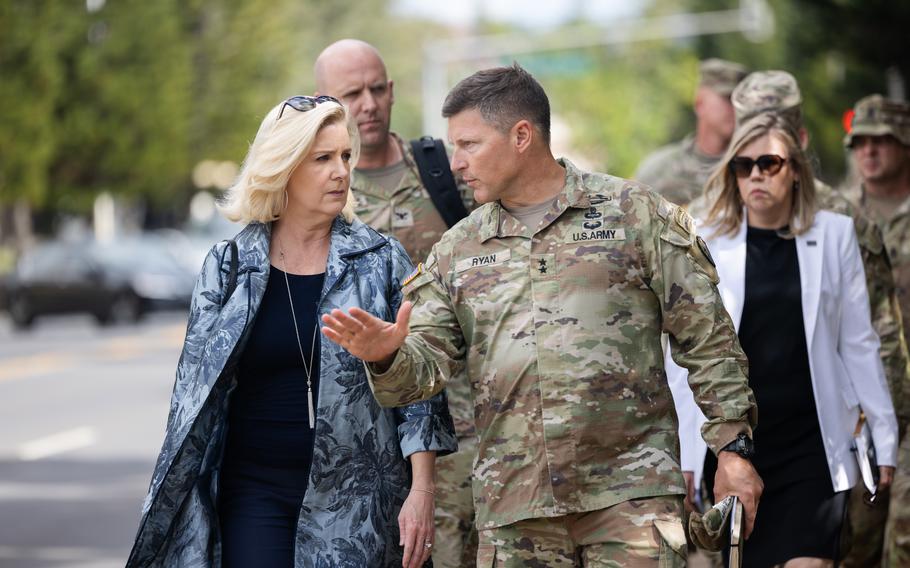
Army Secretary Christine Wormuth speaks with Maj. Gen. Joseph Ryan, commanding general of the 25th Infantry Division, during her visit to Schofield Barracks, Hawaii, on Jan. 24, 2023. (Rachel Christensen/U.S. Army)
WASHINGTON — Two of the Army’s top leaders said Monday that 2023 is an important year for the United States to show China that any attempt to “unify” with Taiwan would meet with a strong U.S.-led coalition of resistance like what Russia is seeing in Ukraine.
“We want to lower the temperature in the relationship with China,” Army Secretary Christine Wormuth said during a discussion on the Indo-Pacific region at the American Enterprise Institute, a Washington-based think tank. “I’m personally not of the view that an amphibious invasion of Taiwan is imminent, but we have to obviously prepare. We have got to be prepared to fight and win that war.”
U.S. and other Western leaders have been concerned for years about China’s rising influence outside its borders, including the entire Indo-Pacific region that stretches from the eastern coast of Africa to the South Pacific and includes countries such as Japan, South Korea, Taiwan, the Philippines and Indonesia.
The Pentagon’s National Defense Strategy late last year identified China as the top “pacing challenge” for the U.S. and certain recent activities in the South China Sea — as well as a surveillance balloon that was shot down this month after it was spotted over the United States — have only increased concerns. Such Chinese actions, coupled with Russia’s invasion of Ukraine last year, have raised worries about the possibility that China might attempt to “unify” with Taiwan, an island that it considers a breakaway Chinese territory.
“Our goal is to avoid fighting a land war in Asia,” Wormuth said. “This is all about deterrence.”
Gen. Charles Flynn, the top commander of U.S. Army Pacific, said during Monday’s discussion that China has sent signals that an invasion of Taiwan is possible at some point, but added Beijing probably isn’t ready to make such a move.
“They are on a historical trajectory. The military arm they have created is extraordinary,” he said. “They are preparing those forces for something. … The prize is Taiwan.”
.jpg/alternates/LANDSCAPE_910/7643908%201.jpg)
Gen. Charles Flynn, commander of U.S. Army Pacific, speaks at Fort Shafter, Hawaii, on Feb. 10, 2023. (Timothy Hughes/U.S. Army)
“They are working on it, but I will tell you from my perspective … they have work to do,” Flynn added. “And I think now is the time for us to get into position to be able to deter that [invasion] from happening.”
Wormuth and Flynn detailed some efforts the Army is pursuing to “create readiness,” including taking advantage of new training and capabilities in the Indo-Pacific, planning for tactical positioning of troops in the region, and deploying long-range hypersonic weapons — ones that can travel at least five times the speed of sound, or Mach 5.
“A lot of people don’t know this, but our first battery of long-range hypersonic weapons is actually training with their ground equipment at [Joint Base Lewis-McChord, Wash.] right now,” Wormuth said. “By this fall, we will have our first battery of long-range hypersonic weapons.”
Both leaders emphasized the importance of congressional support in Washington, especially when it comes to passing necessary spending bills that fund the Pentagon. Also important, they said, is learning lessons from Russia’s invasion of Ukraine.
U.S. and Ukrainian military officials and various news reports have said for months that Moscow has sent Russian troops into battle with little training and limited weapons for the invasion, which has entered its second year. The United States, meanwhile, has pledged more than $30 billion worth of security aid to Ukraine and some of it has come from Defense Department stocks, which must be resupplied.
“Everything we’re seeing in Ukraine shows us that we have to ramp up production,” Wormuth said. “The peacetime, just-in-time supply chain model is not appropriate.”
Congress passed a $1.7 trillion omnibus federal spending bill in late December to fund the government through the end of September and it was signed into law a few days later by President Joe Biden. Congress also passed the National Defense Authorization Act for 2023 and Biden signed it to authorize a Pentagon budget of almost $817 billion.
The U.S. government is fully funded through September, though some political experts have already expressed concerns about possible spending difficulties as early as October and the resulting impact on the U.S. armed forces — mainly due to sharp partisan divides on Capitol Hill and a faction of Republican lawmakers who have already shown a willingness to complicate money matters.
Congressional Republicans have so far refused to agree, for example, on raising the U.S. debt ceiling unless Biden and congressional Democrats agree to tens of billions in spending cuts in other areas such as education, housing and health care.
The U.S. hit the debt ceiling last month without a deal to raise it, but emergency measures by the Treasury are expected to stave off a deadline to deal with it until June. If that passes with no deal from Congress, the U.S. could default on its debts and lead to domestic and global economic trouble.
“Some of the key new weapons systems the Army is developing will be impacted if we go into an extended continuing resolution [from Congress]. So that is very problematic,” Wormuth said about what effects funding troubles could have the military. “If you think about that, that’s really sort of preparing to deter with one hand [tied] behind your back.”